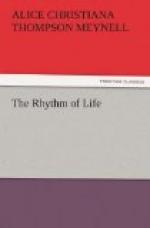If Mr. Patmore really intends that his Odes shall be read with minim, or crochet, or quaver rests, to fill up a measure of beaten time, we are free to hold that he rather arbitrarily applies to liberal verse the laws of verse set for use—cradle verse and march-marking verse (we are, of course, not considering verse set to music, and thus compelled into the musical time). Liberal verse, dramatic, narrative, meditative, can surely be bound by no time measures—if for no other reason, for this: that to prescribe pauses is also to forbid any pauses unprescribed. Granting, however, his principle of catalexis, we still doubt whether the irregular metre of The Unknown Eros is happily used except for the large sweep of the flight of the Ode more properly so called. Lycidas, the Mrs. Anne Killigrew, the Intimations, and Emerson’s Threnody, considered merely for their versification, fulfil their laws so perfectly that they certainly move without checks as without haste. So with the graver Odes—much in the majority—of Mr. Coventry Patmore’s series. A more lovely dignity of extension and restriction, a more touching sweetness of simple and frequent rhyme, a truer impetus of pulse and impulse, English verse could hardly yield than are to be found in his versification. And what movement of words has ever expressed flight, distance, mystery, and wonderful approach, as they are expressed in a celestial line—the eighth in the ode To the Unknown Eros? When we are sensible of a metrical cheek it is in this way: To the English ear the heroic line is the unit of metre, and when two lines of various length undesignedly add together to form a heroic line, they have to be separated with something of a jerk. And this adding—as, for instance, of a line of four syllables preceding or following one of six—occurs now and then, and even in such a masterly measure of music as A Farewell. It is as when a sail suddenly flaps windless in the fetching about of a boat. In The Angel in the House, and other earlier poems, Mr. Coventry Patmore used the octosyllabic stanza perfectly, inasmuch as he never left it either heavily or thinly packed. Moreover those first poems had a composure which was the prelude to the peace of the Odes. And even in his slightest work he proves himself the master—that is, the owner—of words that, owned by him, are unprofaned, are as though they had never been profaned; the capturer of an art so quick and close that it is the voice less of a poet than of the very Muse.




